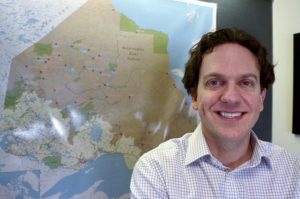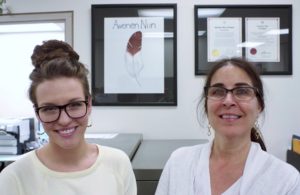Lack of personal identification ‘serious problem across the north’ says Kinna-aweya Legal Clinic director of administration

By Rick Garrick
THUNDER BAY—A Lakehead University professor in partnership with Kinna-aweya Legal Clinic is receiving $196,500 from the federal New Frontiers in Research fund to research the impact of lack of personal identification on the ability of First Nations to access health care.
“It’s trying to explore and better understand why people in northern Ontario are missing personal identification and how widespread the problem is as well,” says Chris Sanders, assistant professor in Sociology at Lakehead University. “We’re working with our community partner, the Kinna-aweya Legal Clinic, and that is mostly in Thunder Bay. They have their ID services program and the workshops that they hold, so we’ve been working with them within the confines of the Thunder Bay district. And what we got funded for is to also reach out to communities in the north, to visit some of them to evaluate the problem and try to get ideas.”
Sanders says they are looking to do two visits this summer and two visits next summer during the two-year research project.
“What we would like to do, ideally, is try to get out east to maybe Fort Albany as well as some in this northern region [northwest of Thunder Bay],” Sanders says. “Also, what we’re going to do is do a couple of communities that are close to Thunder Bay but sort of road access but kind of outside the Thunder Bay district.”
Sanders is working with co-applicants Kristin Burnett, associate professor, Indigenous Learning at Lakehead University, and Kelly Skinner, assistant professor, School of Public Health and Health Systems at the University of Waterloo, on the research project.
“After the post-9/11 requirements around bank accounts, you need a Social Insurance Number in order to get a bank account,” Burnett says. “But without a birth certificate and all the information about your parents and their place of birth, you can’t get a Social Insurance Number. So you need that long-form birth certificate that has all the parental information on it. And if you can’t get a bank account, then you can’t get deposits from whoever pays you. So there are these kind of cascading consequences about not having these right pieces of ID.”

Beth Ponka, director of administration with Kinna-aweya, says the lack of personal identification is a “serious problem across the north.”
“There are a lot of births, particularly with Indigenous families, that haven’t been registered,” Ponka says. “In order to access benefits and have registration under the Indian Act, you have to have your birth registered. And also, that is the only way you can get counted for funding and other decisions that are made by levels of government.”
Fabienne Spiess, ID services coordinator with Kinna-aweya, says a lot of Kinna-aweya clients are interested in participating in the research project.
“They are really excited to have their voice heard,” Spiess says. “We’re not just counting the numbers of people who are applying for birth certificates, we are also trying to gather the stories of the barriers they face, the number of times they have applied for ID, how long their births haven’t been registered. We work with people in their 70s whose births have never been registered, so we’re really excited about partnering with Lakehead because we’re finally having the opportunity to kind of capture people’s stories and we want to bring awareness to how serious the issue is and how many people are affected.”
Kinna-aweya provides services in the Thunder Bay district, which includes most of the Northern Superior Region communities.

